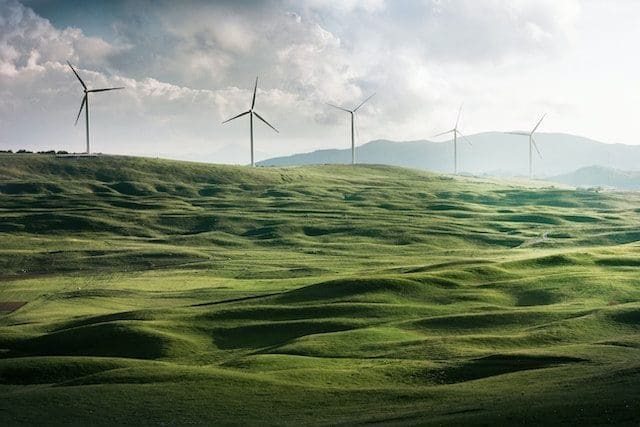Consideo’s Insight into the Global Energy Transition: A Systems Perspective
Complexities of Energy Transition
The global energy transition is a complex challenge. The development of technology, the need for resources, the depletion of high-grade materials and their cost implications, the variances of weather, the different strategies varying the degree of electrification vs. the use of (imported) synthetic fuels, the need for capacities related to the path of transition and the added need with a time delay for repowering of older installations, the developments of demands, etc., all contributes to a bandwidth of possible scenarios including some fatal system archetypes.
Our Simulation Model and Its Reception
A couple of years ago, Consideo developed, in a larger consortium, a simulation model on the global energy transition using data e.g. from the International Energy Agency and its World Energy Outlook. While the implications for the need for materials were well received by the environmental agency of Germany, the notion that we need underutilized capacities for electrolysis (and for repowering) that will not be realized by market forces alone, back then wasn’t.
The Potential of Renewable Energy
It is a simple thing to understand that renewable energy is best utilized by direct electrical use. And since we have those periods without wind or sunshine, we should rely on a grid connecting sunny and windy areas, and on re-electrification from hydrogen that we can produce from surpluses of energy production when the wind and sunshine are there.
The Debate Over Hydrogen and Electrification
While the production of hydrogen implies losses of efficiency, many people nevertheless argue that hydrogen and synthetic fuels (they have no idea where all the carbon for that should come from) would be easier than the widespread electrification of sectors like transportation, housing, or industry. So, from a global perspective, we need a maximum of electrification, leaving the hydrogen for industrial processes, the chemical industry, ammonia for ship transportation, and re-electrification. Nevertheless, some countries don’t want wind energy in their backyards and argue for the import of hydrogen and the use of synthetic fuels. That’s a “shifting the burden to the intervenor” archetype.
Germany’s New Energy Strategy
But now the German government plans for new gas power plants that in the future can re-electrify hydrogen. Additionally, they argue that those underutilized capacities need to be subsidized. Against this logical concept, two kinds of counterarguments are out: first, the argument, that we need no gas power plants or use of hydrogen but more renewables; and second, that we should import energy from France’s nuclear power plants and not become independent using our surpluses of renewable energy. Well, both counterarguments are wrong.
Here is a grey paper featuring the model: The ToC and the Global Energy Transition
Blog Author: Kai Neumann, neumann@consideo.com
About Consideo
Consideo is a recognized leader in the field of systems thinking and modeling. As a sponsor of the 2023 System Dynamics Society, they have showcased their dedication to promoting understanding and education in System Dynamics. Led by Kai Neumann, Consideo offers a range of tools and solutions designed to help individuals and organizations visualize and manage complex systems, facilitating informed decision-making processes. Drawing from their wealth of experience and expertise, their products, such as the renowned IMODELER, are a testament to their commitment to excellence in systems thinking. Learn more about their innovative solutions at Consideo’s website
Recent Posts
Call for Presenters: Seminar Series
Call for Presenters: Seminar Series We at the System Dynamics Society are continually seeking vibrant and knowledgeable presenters for our ongoing Seminar Series. As we unfold the calendar, there’s always a place for more insights, experiences, and expertise to enrich...
Honoring Excellence: A Glimpse into the Awards of the International System Dynamics Conference
Honoring Excellence: A Glimpse into the Awards of the International System Dynamics Conference The International System Dynamics Conference brings together experts, practitioners, and students to exchange ideas, showcase real-world applications, and celebrate...
From Bergen to Global: UiB’s System Dynamics Group
From Bergen to Global: UiB’s System Dynamics Group The System Dynamics Group, an autonomous research group at the University of Bergen (UiB) was established in 1971 by professor emeritus Svein Nordbotten. Inspired by the work of Jay W. Forrester, Nordbotten...
Upcoming Events
Health Policy SIG Networking and Collaboration Event
Please join us for our quarterly Health Policy SIG virtual social hour! Agenda: TBD
Recent Business cases
Solving Bottlenecks in Dairy Production Facilities with System Dynamics
Solving Bottlenecks in Dairy Production Facilities with System Dynamics EXECUTIVE Summary FrieslandCampina faced potential bottlenecks in production due to the merging of two factories. They hired SD&Co which employed system dynamics simulation models to predict...
A Design Value Calculator: A System Dynamics Boardgame
A Design Value Calculator: A System Dynamics Boardgame EXECUTIVE Summary Product design is a specific form of complex innovation that touches all areas of an organization’s management. While entrepreneurs recognise the value of design, they often tend to focus...
The World Bank Uses System Dynamics to Identify Root Causes of Poverty
The World Bank Uses System Dynamics to Identify Root Causes of Poverty EXECUTIVE Summary Madagascar has one of the highest poverty rates in the world. In 2022, an astonishingly three out of every four people in Madagascar lived below the poverty line. Poverty has...



